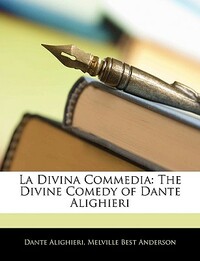Take a photo of a barcode or cover
307 reviews for:
La Divina Commedia: The Divine Comedy of Dante Alighieri
Melville Best Anderson, Dante Alighieri
307 reviews for:
La Divina Commedia: The Divine Comedy of Dante Alighieri
Melville Best Anderson, Dante Alighieri
challenging
mysterious
reflective
slow-paced
Plot or Character Driven:
A mix
Strong character development:
Yes
Loveable characters:
Yes
Diverse cast of characters:
No
Flaws of characters a main focus:
Yes
adventurous
emotional
reflective
medium-paced
Plot or Character Driven:
Character
Strong character development:
Complicated
Loveable characters:
No
Diverse cast of characters:
No
Flaws of characters a main focus:
Yes
adventurous
challenging
dark
emotional
hopeful
inspiring
mysterious
reflective
sad
tense
adventurous
challenging
dark
mysterious
reflective
relaxing
medium-paced
Plot or Character Driven:
Character
Strong character development:
No
Loveable characters:
Yes
Diverse cast of characters:
Yes
Flaws of characters a main focus:
Yes
Still having a great time, but the story loses something once you're away from the demons
adventurous
challenging
emotional
hopeful
reflective
medium-paced
Plot or Character Driven:
Plot
Strong character development:
Yes
Loveable characters:
Complicated
Diverse cast of characters:
No
Flaws of characters a main focus:
Yes
adventurous
challenging
hopeful
informative
inspiring
reflective
fast-paced
Plot or Character Driven:
A mix
Strong character development:
Complicated
Loveable characters:
No
Diverse cast of characters:
Yes
Flaws of characters a main focus:
Yes
adventurous
hopeful
mysterious
reflective
medium-paced
Plot or Character Driven:
Plot
Strong character development:
No
Loveable characters:
No
Diverse cast of characters:
Yes
Flaws of characters a main focus:
Yes
The second part to Dante Alighieri's the Divine Comedy, Purgatory picks up right after Dante and his guide, Virgil exit the depths of Hell. In Dante's vision of Purgatory, we learn that he has devised a multi-level ascent which is a reverse of the underworld of the Inferno. Dante and Virgil proceed into Purgatory and meet a wide array of spirits, some contemporaries of Dante, but most are figures of Italian, European or classical history. They also encounter many angels that serve to gather or guide the souls on their way.
This part of the Divine Comedy is considered "low comedy" as it does not end with a sad or tragic ending. Given that the setting is Purgatory, all the spirits that Dante encounters are purging themselves of sin and ascending to Paradise. This isn't exactly a "happy" state but the end result of the sinner's purging will result in their ultimate ascent to heaven. Depending on the sin, the purging can manifest in some sort of physical or mental penance that can last many earthly lifetimes.
As with the Inferno, I found it more helpful to read a guide to learn more about the various characters Dante describes in his cantos. It helps tremendously to understand the politics and culture of his time and gives greater meaning to the encounters he has with the spirits and angels. There's also a super helpful video guide posted on YouTube by AspectHistory that breaks down the meaning of several cantos in 10-20 minute videos:
https://www.youtube.com/c/AspectHistory
This part of the Divine Comedy is considered "low comedy" as it does not end with a sad or tragic ending. Given that the setting is Purgatory, all the spirits that Dante encounters are purging themselves of sin and ascending to Paradise. This isn't exactly a "happy" state but the end result of the sinner's purging will result in their ultimate ascent to heaven. Depending on the sin, the purging can manifest in some sort of physical or mental penance that can last many earthly lifetimes.
As with the Inferno, I found it more helpful to read a guide to learn more about the various characters Dante describes in his cantos. It helps tremendously to understand the politics and culture of his time and gives greater meaning to the encounters he has with the spirits and angels. There's also a super helpful video guide posted on YouTube by AspectHistory that breaks down the meaning of several cantos in 10-20 minute videos:
https://www.youtube.com/c/AspectHistory
John Ciardi's Translation (New American Library) 1961. Definitely a lot more of a slog than the Inferno. I can see why most people stop at that one. I'm not going to bother with the Paradiso. There's a lot more thological allegory here, but much less crazy antics. Still plenty of digressions on medieval Italy, and discussions on morality etc that are hard to get through. Good translation though- it was well annotated. I'm not sure the poetry was fully captured though




